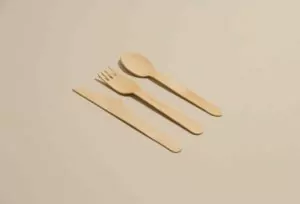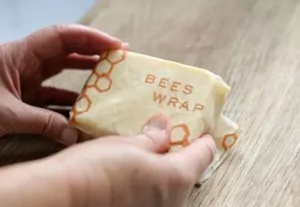This Plastic Free July we’re sharing 31 plastic-free swaps that you can get involved in, that’s one for every day of the month. See how many you can do and let us know how you get on!
- Approximately 40 billion plasticbottles are used globally each month. Bring your own water bottle and reduce your plastic footprint.
- In the US alone, over 50 billion coffee cupsare thrown away every year. Bring your own coffee mug, some franchises even charge you less for bringing your own!
- Tea bags release billions of plastic particlesinto your brew which then enter the water system. Opt for loose leaf tea to avoid ingesting these microplastics.
- Over 25 billion plastic strawsare used each year in Europe, bring your own reusable straw or just go without! Our Climate Wise reusable straw has a keyring so you can have it on you at all times.
- Every toothbrush ever created still exists. Why not switch to a bamboo toothbrush so you don’t have your toothbrushes hanging around for eternity.
- Floss is plastic coated with PFCs, a chemical found in Teflon – beyond being plastic it’s toxic. Use a bio-based product that you can refill instead.
- We all remember the image of the seahorse holding a cotton swabthat went viral back in 2017. Opt for a reusable option and avoid adding to the 1.5 billion single-use Q-tips used daily.
- Avoid excess plastic bottles by switching to shampoo and conditioner bars. The main ingredient in these plastic bottles is water, opt for eco-alternatives to get your money’s worth.
- Choose plastic-free and refillable alternatives when it comes to detergents. You can now buy strips to place in your machine which is small pieces of paper that disintegrate without leaving any plastic behind.
- We’ve all used a lot more hand sanitiser since 2020, but a lot of it comes in plastic bottles. Choose plastic-free and refillable alternatives when without contributing to the single-use plastic crisis.
- Drink stirrers can make a cocktail look nice or help stir a coffee shop beverage, however, they end up in our oceans and beaches. Use bamboo stirrers or reusable glass alternatives, or leave it out!
- Balloons are a nice decoration at celebrations, however, what goes up must eventually come down. Skip the balloons and opt for eco-friendly options such as recycled bunting.
- Plastic cutlery mostly ends up in landfills taking centuries to degrade. Next time you order a takeaway, make sure you ask that no cutlery is given. Try to take reusable utensils with you for when you’re out and about.
- It’s not only the cutlery that has a plastic footprint with your takeaway but also the packaging. Try to support takeaways that avoid plastic packaging, or ask if you can provide your own container.
- Plastic plates can be great for a picnic, but they last a lot longer than just the picnic. Take porcelain plates with you or use natural alternatives such as banana leaves.
- Some perfume contains volatile organic compounds that react with sunlight to form ozone pollution. Get yourself a low-waste perfume made from essential oils with safe ingredients and no parabens.
- Estimates state that over 2 billion razorsare thrown away every year. Many companies are now providing reusable and plastic-free options, why not check them out!
- Did you know that most wrapping paper contains plastic? Use an eco-friendly alternative such as fabric or old newspapers.
- Cellotape also adds a layer of plastic to your presents. Companies have recently launched plastic-free tape, or you could use ribbon or cloth.
- Supermarkets in the UK giveaway 5 billion plastic bagsa year. Most plastic bags are used for just 12 minutes yet last for hundreds or thousands of years. Take a bag with you whenever you go shopping.
- When putting your washing out to dry, are you using plastic pegs? Check out eco-friendly alternatives such as biodegradable bamboo pegs with recyclable steel springs.
- Instead of using the plastic produce bags available in stores, bring your own mesh cotton produce bags.
- Store your snacks in silicone reusable snack bags to avoid unnecessary plastic waste
- Visit refill stores to top up on your groceries such as pasta and grains. Store it in glass food jars to avoid frequently buying plastic.
- Rather than covering your food in clingfilm and coating it in plastic, opt for eco-alternatives such as beeswax food wraps.
- Kitchen sponges are made from polyester or nylon, non-biodegradable materials made from non-renewable sources such as oil and has. Instead, use a loofah, they last longer, are compostable, and you can microwave them to kill germs.
- Wet wipes are generally made from polyethylene, a type of plastic. They break down into fibers which then pollute water sources and eventually harm marine life. More and more companies are now releasing 100% organic cotton, plant-based which is better for your body and the planet – give them a try!
- Toothpaste tubes have a variety of materials including plastic, aluminum, and steel. Leave the tube behind and try out toothpaste tablets, or take it one step further and make your own toothpaste.
- Cotton balls and pads are not only wrapped in plastic but if they’re not 100% cotton they’ll be filled with harmful chemicals and pesticides. Opt for reusable makeup pads to make your pads last longer.
- Conventional period products are filled with plastic, disposable tampons can be up to 90% plastic. There are numerous eco-friendly options now including period cups, reusable pads, and biodegradable pads and tampons.



Check the labels next time you’re shopping and choose items made from natural fibers such as linen, hemp, or cotton. If you need synthetic products, aim to purchase recycled materials.






